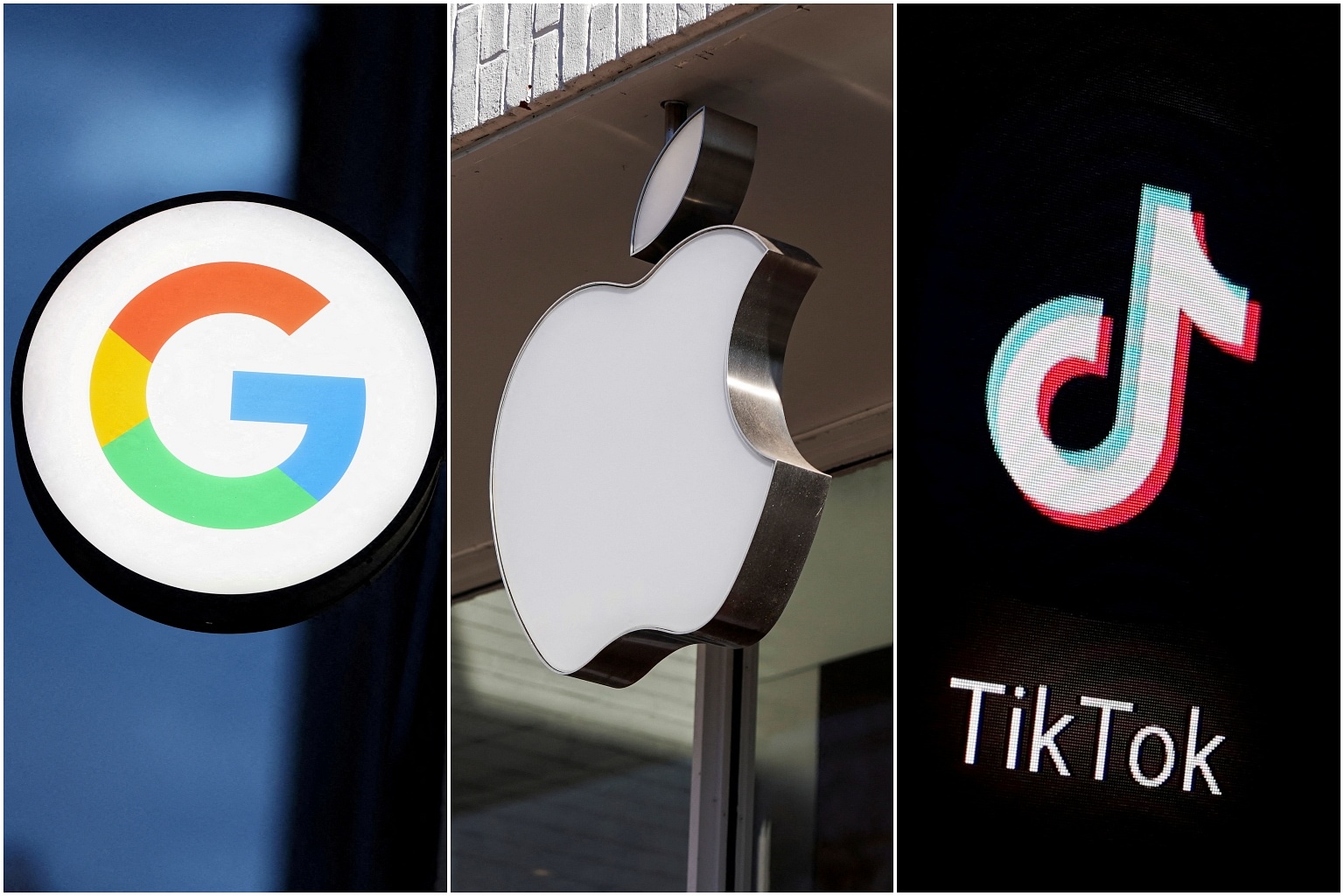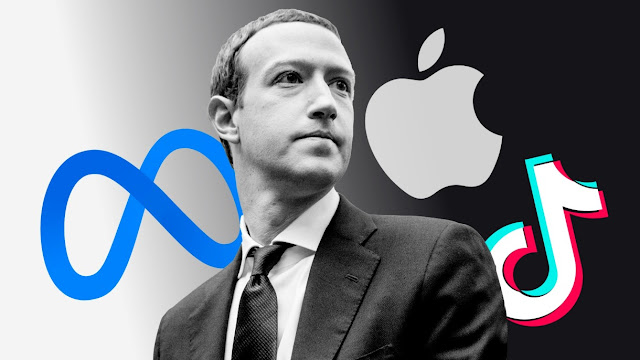Meta, the company is formerly known as Facebook, suffered the stock market's biggest one-day wipe-out ever on Thursday (Feb 3) as its stock plummeted 26 percent and its market value plunged by more than US$230 billion (S$309 billion).
Its crash followed a dismal earnings report on Wednesday when chief executive Mark Zuckerberg laid out how the company was navigating a tricky transition from social networking towards the so-called virtual world of the metaverse.
On Thursday, a company spokesman reiterated statements from its earnings announcement and declined to comment further.
Here are six reasons that Meta is in a difficult spot.
1. User growth has hit a ceiling
The salad days of Facebook's wild user growth are over.
Even though the company on Wednesday recorded modest gains in new users across its so-called family of apps - which includes Instagram, Messenger, and WhatsApp - its core Facebook social networking app lost about half a million users over the fourth quarter from the previous quarter.
That's the first such decline for the company in its 18-year history, during which time it had practically been defined by its ability to bring in more new users.
Meta's executives have pointed to other growth opportunities, like turning on the money faucet at WhatsApp, the messaging service that has yet to generate substantial revenue. But those efforts are nascent.
Investors are likely to next scrutinize whether Meta's other apps, such as Instagram, might begin to hit their top on user growth.
2. Apple's changes are limiting Meta
Last spring, Apple introduced an "App Tracking Transparency" update to its mobile operating system, essentially giving iPhone owners the choice as to whether they would let apps such as Facebook monitor their online activities. Those privacy moves have now hurt Meta's business and are likely to continue doing so.
Now that Facebook and other apps must explicitly ask people for permission to track their behavior, many users have opted out. That means fewer user data for Facebook, which makes targeting ads - one of the company's main ways of making money - more difficult.
Doubly painful is that iPhone users are a far more lucrative market to Facebook's advertisers than, say, Android app users. People who use iPhones to access the Internet typically spend more money on products and apps served up to them from mobile ads.
Meta said on Wednesday that Apple's changes would cost it US$10 billion in revenue over the next year.
The company has railed against Apple's shifts and said they are bad for small businesses that rely on advertising on the social network to reach customers. But Apple is unlikely to reverse its privacy changes, and Meta's shareholders know it.
3. Google is stealing online advertising share
Meta's troubles have been its competitors' good fortune.
On Wednesday, Meta's chief financial officer David Wehner noted that as Apple's changes have given advertisers less visibility into user behavior, many have started shifting their ad budgets to other platforms - namely Google.
In Google's earnings call this week, the company reported record sales, particularly in its e-commerce search advertising. That was the same category that tripped up Meta in the last three months of 2021.
Unlike Meta, Google is not heavily dependent on Apple for user data. Mr Wehner said it was likely that Google had "far more third-party data for measurement and optimization purposes" than Meta's ad platform.
Mr Wehner also pointed to Google's deal with Apple to be the default search engine for Apple's Safari browser. That means Google's search ads tend to appear in more places, taking in more data that can be useful for advertisers. That's a huge problem for Meta in the long term, especially if more advertisers switch to Google search ads.

4. TikTok vs Reels
For more than a year, Mr Zuckerberg has pointed to how formidable TikTok has been as a foe. The Chinese-backed app has grown to more than one billion users on the back of its highly shareable and strangely addictive short video posts. And it is fiercely competing with Meta's Instagram for eyeballs and attention.
Meta has cloned TikTok with a video product feature called Instagram Reels. Mr Zuckerberg said on Wednesday that Reels, which is prominently placed in people's Instagram feeds, was currently the No. 1 driver of engagement across the app.
The problem is that while Reels may be attracting users, it does not make money as effectively as Instagram's other features, like Stories and the main feed.
That's because it is slower to make money off video ads since people tend to skip past them. That means the more that Instagram pushes people towards using Reels, the less money it may make on those users.
5. Spending on the metaverse is crazy
Mr Zuckerberg believes so much that the Internet's next-generation is the metaverse - a still fuzzy and theoretical concept that involves people moving across different virtual and augmented-reality worlds - that he is willing to spend big on it.
So big that the spending amounted to more than US$10 billion last year. Mr Zuckerberg expects to spend even more in the future.
Yet there is no evidence the bet will pay off.
6. Antitrust specter looms
The threat of United States regulators coming for Facebook just won't go away.
Meta faces multiple investigations, including from a newly aggressive Federal Trade Commission and multiple state attorneys-general, into whether it acted in an anti-competitive manner. US lawmakers have also coalesced around congressional efforts to pass antitrust Bills.
Mr Zuckerberg has argued that Meta is not a social networking monopoly. He has pointed furiously to what he calls "unprecedented levels of competition", including from TikTok, Apple, Google, and future opponents.
But the threat of antitrust action has made it more difficult for Meta to buy its way into new social networking trends.
Amazon’s stock jumped in after-hours trading on Thursday after the company announced a 17 per cent increase in the price of its popular Prime membership scheme.
Earnings boosted by Amazon’s cloud computing division and its investment in electric vehicle maker Rivian also powered gains of more than 15 percent for the eCommerce group in after-hours trading.
Wall Street’s enthusiastic reaction to the Prime pricing announcement and earnings release followed an almost 8 per cent decline in Amazon shares during the trading day, as tech stocks were caught up in a rout prompted by the plunge in shares of Facebook owner Meta.
If the after-hours gain holds, it would be the company’s biggest one-day share price rise since October 2009.
Amazon said on Thursday that the increase in the Prime membership cost, from $119 to $139 a year, was due in part to a rise in “wages and transportation costs” in its logistics network.
Brian Olsavsky, chief financial officer, said Amazon had seen high rates of staff absence due to the Omicron variant of coronavirus. “There are instances where you’re paying twice or three times for the same labour hour,” he said.
Citing similar strains, he forecast lower than expected sales of between $112bn and $117bn for the current quarter. Wall Street had been anticipating sales in excess of $120bn.
The increase in the price of the Prime membership will come into effect for US customers later this month, or in March for existing members. It is the third price increase since Amazon introduced Prime in 2005.
The company did not comment on whether it intended to raise prices in other international markets. In the fourth quarter, revenue from subscription services, which includes Prime memberships, was $8.1bn, up 15 per cent year on year.
One former Amazon executive described the Prime price increase as a “very dangerous move” designed to please the markets at the expense of consumers.
“Amazon has a lot of network effects, it has Prime Video and Alexa and all of these things that are tied to the Prime membership,” said Guru Hariharan, chief executive of e-commerce management platform CommerceIQ. “But this is going to start stress testing that,”
Hariharan said CommerceIQ’s data on thousands of products sold on Amazon showed a 9 per cent price increase across the board in December 2021 compared with a year prior.
Amazon’s earnings showed strong growth in cloud computing, with Amazon Web Services reporting 40 per cent revenue growth year on year. Without cloud revenues, it would have posted an operating loss of $1.8bn.
Net income in the fourth quarter of $14.4bn included a pre-tax valuation gain of $11.8bn from an investment in Rivian, which went public late last year.
Revenue for the quarter grew in line with Wall Street’s expectations, up 9 per cent on the same period last year to $137.4bn. Operating income took a heavy hit from increased staffing costs and other Covid-related pressures, down 49 per cent on the same period in 2020 to $3.5bn.
Amazon added 140,000 employees in that time, bringing its global total to 1.6mn, not including delivery drivers.
“As expected over the holidays, we saw higher costs driven by labor supply shortages and inflationary pressures, and these issues persisted into the first quarter due to Omicron,” said Andy Jassy, chief executive. “Despite these short-term challenges, we continue to feel optimistic and excited about the business as we emerge from the pandemic.”
For the first time, Amazon broke out its revenue for its advertising business, which in the past quarter was second in growth only to AWS, increasing 32 per cent year on year to $9.72bn, taking revenue for the segment to $31bn for the year.
Amazon said Apple’s recent privacy changes had not had a notable effect, in contrast with Facebook, which said it had lost roughly $10bn in revenue as a result.
“The opportunities for brands to engage customers across Amazon’s properties is largely unchanged,” said Dave Fildes, director of investor relations.

